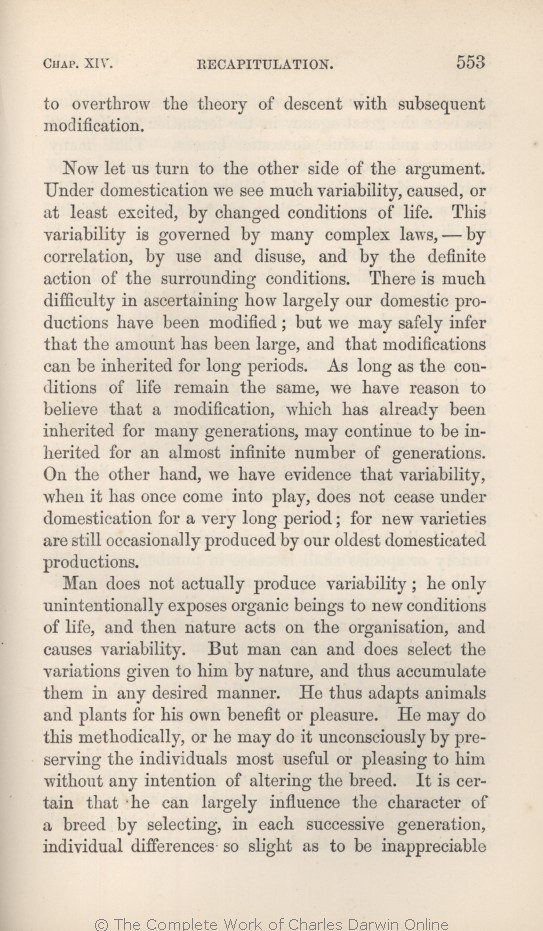Now let us turn to the other side of the argument. Under domestication we see much
variability, caused, or at least excited, by changed conditions of life. | variability, caused, or at least excited, by changed conditions of life. 1869 |
| variability. 1859 1860 1861 1866 |
| variability, caused, or at least excited, by changed conditions of life; but often in so obscure a manner, that we are tempted to consider the variations as spontaneous. 1872 |
| 1 blocks not present in 1869 1872; present in 1859 1860 1861 1866 | | This seems to be mainly
due to the reproductive system being eminently susceptible to changes in the conditions of life; so that this system, when not rendered impotent, fails to reproduce offspring exactly like the parent-form.
|
| This variability 1869 | | Variability 1859 1860 1861 1866 1872 |
| correlation, 1869 | | correlation 1859 1860 1861 1866 | | correlated 1872 |
| ..... 1869 | | of growth, 1859 1860 1861 1866 | | growth, 1872 |
| by 1859 1860 1861 1866 1869 |
| compensation, the increased 1872 |
| disuse, 1859 1860 1861 1866 1869 | | disuse 1872 |
| and by the definite 1869 |
| and by the direct 1859 1860 1861 1866 |
| of parts, and the definite 1872 |
| surrounding 1869 1872 | | physical 1859 1860 1861 1866 |
| conditions. 1869 1872 | | conditions 1859 1860 1861 1866 |
| ..... 1869 1872 | | of 1859 1860 1861 1866 |
| ..... 1869 1872 | | life. 1859 1860 1861 1866 |
| largely 1869 1872 | | much modification 1859 1860 1861 1866 |
| been modified; 1869 1872 | | undergone; 1859 1860 1861 1866 |
| hand, 1866 1869 1872 | | hand 1859 1860 1861 |
| variability, 1859 1860 1861 1866 1869 | | variability 1872 |
| ..... 1869 1872 | | wholly 1859 1860 1861 1866 |
| cease 1869 1872 | | cease; 1859 1860 1861 1866 |
| under domestication for a very long period; for 1869 |
| for 1859 1860 1861 1866 |
| under domestication for a very long period; nor do we know that it ever ceases, for 1872 |
| oldest 1869 1872 | | most anciently 1859 1860 1861 1866 |
|
Man does | Man does 1859 1860 1861 1866 1869 | | Variability is 1872 |
| produce variability; 1859 1860 1861 1866 1869 |
| caused by man; 1872 |
| organisation, 1859 1860 1861 1866 1869 | | organisation 1872 |
| variability. 1859 1860 1861 1866 1869 |
| it to vary. 1872 |
| accumulate 1859 1860 1861 1866 1869 | | accumulates 1872 |
| or pleasing to him 1869 1872 |
| to him at the time, 1859 1860 |
| to him at the time 1861 |
| to him 1866 |
| intention 1869 1872 | | thought 1859 1860 1861 1866 |
| ..... 1861 1866 1869 1872 | | quite 1859 1860 |
|









